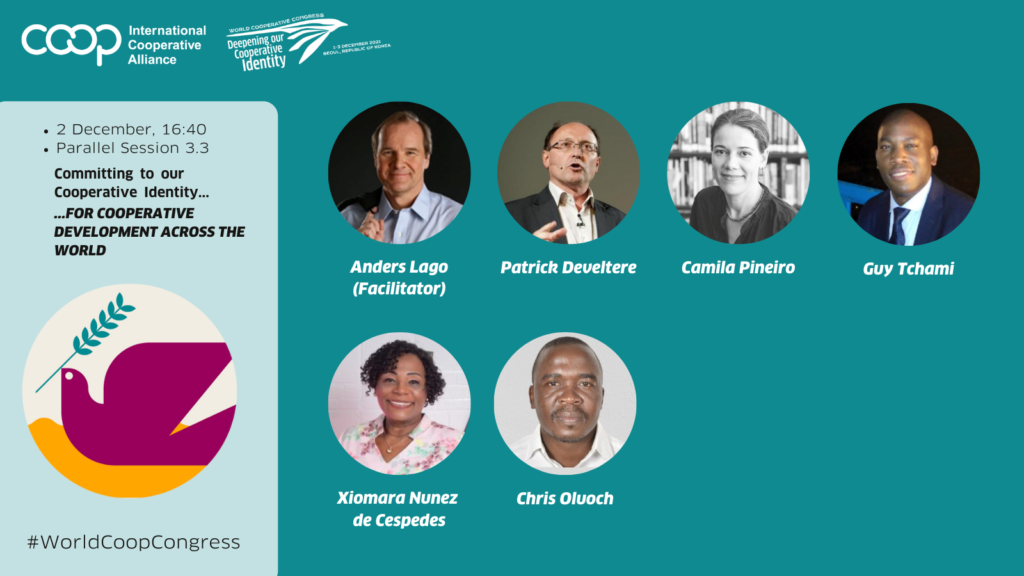
What are the lessons to be learned from successes and failures in international cooperative development? This question was explored in parallel session 3.3 on Committing to Our Cooperative Identity for Cooperative Development Across the World on the afternoon of 2 December at the World Cooperative Congress.
Anders Lago, Chair of the ICA International Cooperative Development Platform and ICA Board Director, facilitated the session and introduced it by sharing some examples of how cooperatives have played a part in the development of countries, including his home country of Sweden.
Patrick Develtere, Professor of International Development Cooperation, University of Leuven, Belgium, explored the main opportunities and challenges for international development cooperation. Mr Develtere argued that there has been a shift away from a “North – South Deficit” paradigm, where the globe was conceptually split into the developed north and underdeveloped south, towards a more global perspective where value and need are recognised in both the north and south. This means that the work of international development is becoming more of a peer-to-peer endeavour, which seeks new and different forms of expertise and offers opportunities for cooperatives, provided it commits to decolonising development and moving away from paternalistic development models.
Camila Piñeiro Harnecke, Practice Area Director at NCBA CLUSA, spoke in her presentation about the role of intercooperation in international cooperative development. “Intercooperation with other cooperative development organisations has always been a critical strategy for NCBA CLUSA,” said Ms Piñeiro Harnecke. She quoted a resolution on cooperative development from the 2019 ICA General Assembly in Kigali which states that it is crucial that coops are recognised as indispensable actors in the pursuit of sustainable development, and calls for more intercooperation in this area.
Guy Tchami, Programme Manager at the International Labour Organisation(ILO), spoke about the services ILO provides to cooperatives and the social and solidarity economy, including advice on policy and legislation, training and capacity building, partnerships, research and knowledge generation and development cooperation.
Mr Tchami gave a number of examples of how the ILO is partnering with the cooperative movement around development goals, including on child labour and in displacement contexts. Mr Tchami stated in his presentation that “cooperatives are uniquely placed to support displaced persons and host populations by combining activities that support economic and human capital development, alongside a strong focus on self-help and collective action,” and ended on the key message that “cooperative development is not an end in itself, but rather a means to address decent work deficits.”
Vice President of the ICA Gender Equality Committee, Xiomara Núñez de Céspedes, presented to the session on SDG number five – gender equality and empowerment of women and girls, linking this to a call for more women to be in cooperative decision making posts. “When women and men collaborate together as leaders we can have a broader view of the needs and services that cooperatives must give to answer the needs of communities,” said Ms Núñez de Céspedes.
Ms Núñez de Céspedes offered three suggestions for actions to further the fifth SDG – to educate families and communities on equality and democracy, to draw on and apply the cooperative values and principles, e.g. one member, one vote, and to eliminate discriminsation and violence from our coops, including socio-economic violence.
The final speaker of the session was Chris Oluoch, Program Director at Fairtrade Africa, who spoke to attendees about the work of Fairtrade in global development and how they see cooperatives as a key part of this.
“Cooperatives remain an important feature of our sustainability approach because, at the basic unit, a cooperative is a unique business model owned by their members,” said Mr Oluoch. He went on to say that the work of cooperative enterprises “aligns very well with our mission to empower, to enable sustainable livelihoods and to make trade fair.”
